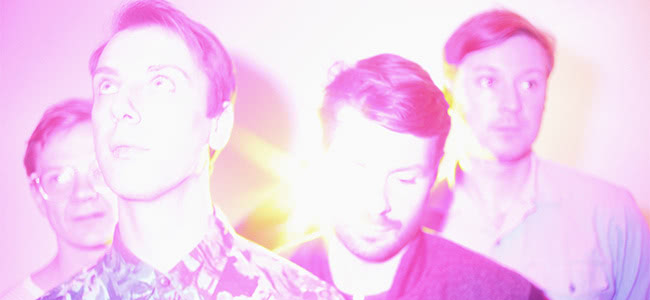Django Django are not named after the pioneering jazz guitarist Django Reinhart, the new Quentin Tarantino movie, or the web framework (probably).
Rather than wasting time discussing the origins of their name, Django Django have been concentrating on making good music.
Their double A-side single, “Storm”/”Love’s Dart”, got the ball rolling, and their self-titled debut album was released early in 2012 to critical acclaim.
Both were recorded in producer/drummer David Maclean’s East London bedroom, but don’t mistake Django Django for amateurish teenagers – their music has been described as adventurous, eclectic, glorious, passionate and joyous.
Maclean (yes, the brother of John Maclean from the Beta Band), didn’t expect such a great reception, especially for a bedroom album. “In my head, it was quite an underground record, and only certain people would like it,” the de facto leader muses.
The band certainly didn’t expect it to do so well overseas. In fact, Maclean adds, “it’s almost done better abroad than it has at home in the UK, which is amazing.”
Now that their debut has been so well received, they’re moving out of the bedroom and into a “proper” studio, though “it’s not that different from the bedroom,” Maclean says.“A lot of the songs on the album weren’t much work, because they kind of did it themselves.”
The set-up is the same: a computer, a record deck, and a few amps. “So there will be nothing in a change of style,” he promises. “It’s just nice to not be in the flat, to not be sitting at the end of your bed, stuff like that. But it’s not that different, really.”
The one thing that might change is their timeframe. Django Django took as long as they needed with the album – as their biography points out. There was no pressure on them to hole themselves up in a studio and emerge two weeks later with a full record. The next time round may be a bit different, but the process will probably be more or less the same.
Maclean describes the making of much of their music as beginning with an idea. “A lot of the songs on the album weren’t much work, because they kind of did it themselves.” Other songs were more of a singular notion or a groove. “They needed a lot of fleshing out, kind of in the way that dance music and disco music works, when you have layers of rhythms.”
Anyone who has listened to Django Django’s music will understand what he’s talking about. On stage however, the opposite is the case: “When it’s performed live, it’s about stripping them back again.”
Looking back to the beginning, their getting together also occurred quite naturally. All four members studied and met at Edinburgh College of Art in Scotland.
After they moved to London, the quartet became a proper band. “Me and Vinnie [Vincent Neff, singer and guitarist] started chatting and I said I’d record his songs for him, and get them into a state where they were songs to be recorded, and he asked to do a gig,” he recounts.”
“So then we started calling people, and the people we knew were Tommy [Grace, synth operator] and Jim [Dixon, bassist], from college back in Scotland, so we all just kind of got back together.”
However, before that, they were “kind of nearly a band,” Maclean reveals. “Me and Tommy had talked about starting a band in Edinburgh. In fact, we were nearly a band. But we never got past about five hours of talking.” The almost-band never even got around to choosing a name.
Django Django, on the other hand, is alive and kicking. They’ve shown a desire to explore, and explore they have. By Maclean’s account, they have been everywhere in Europe, America and Australia, and have Russia on their “to-play” list.[Japan] was almost like being on another planet…”
A highlight was Japan, “which was almost like being on another planet,” he remembers. “Europe, America and Australia are all quite similar. But then you go somewhere like Japan, and everything is new and different. The language is so foreign, and the writing, and the way they interact. So that was really exciting, going there for the first time,” enthuses Maclean.
Australia was also on the list of highlights, which is why they’re coming back at the end of the year for the Falls Festival, Southbound Festival, and a string of sideshows. This time they’ll experience an Australian summer, and the band are ready to do some sightseeing. “The weather will be great,” says Maclean, “hopefully we’ll get to see as much as possible of the place.”
Aside from the touristuy business, Django Django will be playing with some great bands on their headline gigs; The Griswolds, Palms and Twinsy. “Sometimes we do [get to choose our support bands], but this time round we’ve not had any input,” Maclean confesses. He doesn’t mind though: “I think it’s better to let someone else pick them because it’s a surprise when you get to see them live.”
Django Django is out now through Because Music. Django Django play Southbound (details here) and the Falls Festival at New Year’s, details here; and three sideshows in early January. Full dates and details here.




































